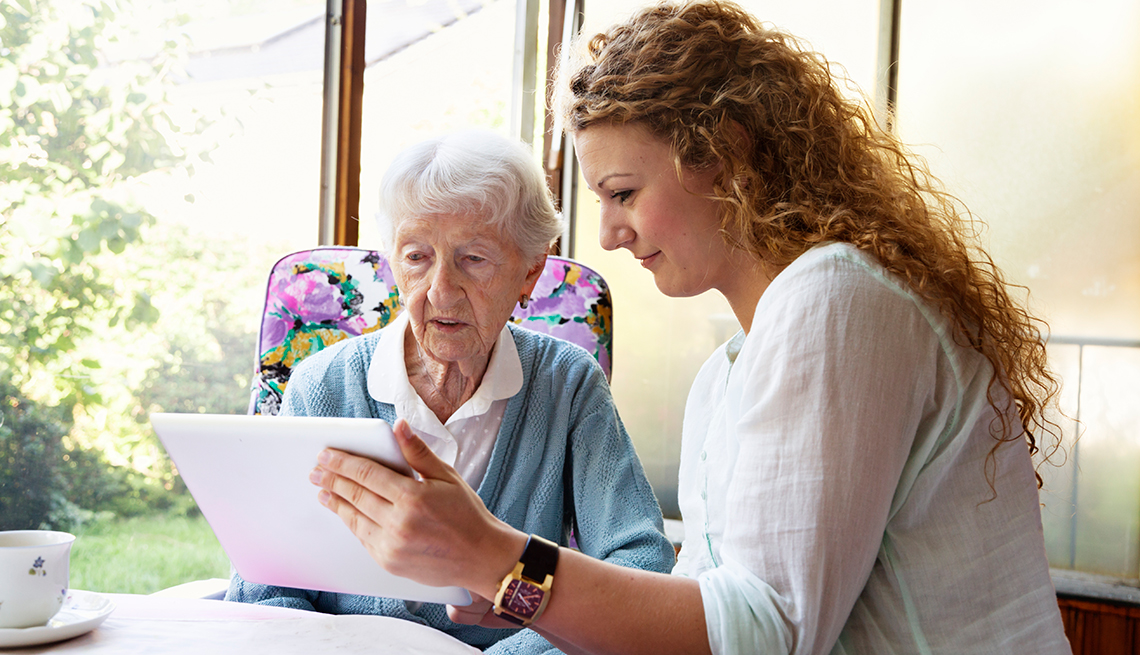How to Be an Effective Advocate for Aging Parents
5 skills that will help you care for the ones you love
En español | As family caregivers, we play many roles: scheduler, money manager, house cleaner, health aide, nurse, navigator, nurturer and more. Perhaps the most important role, though, is advocate, as we ensure the best life possible for our loved ones when they are vulnerable.
That includes understanding their wishes for care and quality of life, and making sure those wishes are respected. It means helping them manage financial and legal matters. And it means making sure they receive appropriate services and treatments, of the highest quality, when they need them. We are their voices when they are unable to advocate for themselves.
If the thought of being an advocate for others seems overwhelming, relax. You probably already have the skills to be effective; you just need to develop and apply them in new ways. Here are the five attributes I think are most important.
AARP Membership -Join AARP for just $12 for your first year when you enroll in automatic renewal
Join today and save 25% off the standard annual rate. Get instant access to discounts, programs, services, and the information you need to benefit every area of your life.
1. Powers of observation
Caregivers are often too busy or exhausted to notice small changes, but the slightest shift in our loved ones’ abilities, health, moods, safety needs or desires may indicate a much larger medical or mental health issue. Catching those changes early can make all the difference in alleviating the problem.
Equally crucial is keeping a close eye on the services they are receiving and adjusting any subpar care. The COVID-19 pandemic has hindered this kind of observation, preventing many caregivers from accompanying loved ones to the hospital or visiting them at home or in a long-term care facility.
How to be more observant
- Try developing your observational skills through mindfulness and meditation, which help you become more aware and fully present in the current moment. Practice in a class, through yoga instruction or with a mindfulness app.
- Get adequate sleep to keep your mind clear.
- Take notes on your observations about your loved ones so you can track changes over time. If in-person interactions are limited, enlist staff or neighbors who are interacting with them to report back to you.
- Use technology. Phone calls help, but video calls via apps like Zoom, Skype or FaceTime can tell you more about subtle changes in a loved one's physical appearance and abilities. Try a remote monitoring system to track their movements at home and detect changes in routine, such as staying in bed longer.
2. Organizational skills
It can be tough to stay on top of a caregiving plan, with its many moving parts. As an advocate, you'll need to manage your loved one's caregiving team, make task lists and organize the mounds of paperwork associated with health, legal and financial matters. You'll want to make sure you can easily access all legal documents (such as powers of attorney for finances and health care) when you need them.
How to get better at organization
- Consider taking an organizing course, or getting outside help. Ask family or friends to assist, or see about working with a professional organizer. When I was caring for both of my parents and my sister, moving and starting a new job all at once, I consulted a professional to develop an organizational plan. (You can make this option more affordable by implementing the plan yourself, as I did.)
- Tech can help here, too. For example, there are numerous caregiving apps.
- Make digital copies of key documents, such as medication lists, medical history, powers of attorney and living wills), so you can access them on the go from your phone or tablet.
3. Communication skills
This is key for building relationships with those who help care for our loved ones, from family members to lawyers, doctors and more. We may not be experts on medical, legal or financial matters, which can make some discussions tough. Caregiving can be an emotional roller coaster, which can also complicate communication.
How to communicate more effectively
- Be respectful. Try to set emotions aside when you are advocating for a loved one. Remember that to communicate effectively, listening is just as important as speaking.
- Do your homework before meetings with lawyers, medical professionals and other providers, and have notes ready. Be clear, concise and get to the point.
- To ease communication with busy professionals, find out who in their office handles business like appointments and billing, and build relationships with them. Get to know how they prefer to communicate (phone, email, text, etc.) and the best time of day to reach them. And always express appreciation.
4. Asking questions
Dad, a former professor, used to have a sign in his office that read, “Question everything.” As I advocated for him for 12 years while he lived with Alzheimer's, I often thought of that message. My family's doctors and service providers could attest that I ask plenty of questions!
As a caregiver, it's part of your job to gather information — don't be shy about it. It never hurts to ask, and many times you'll miss something if you don't.
How to ask the right questions
- Educate yourself about your loved one's health conditions, finances and legal affairs.
- Be prepared with a list of questions for phone calls or meetings with facilities staff, doctors and other professionals. Don't give up until you are satisfied you've got the answers you need to advocate effectively. Never assume; always clarify.
- If you hit a roadblock in arranging care or services, question it and think about other ways to achieve the goal. Sometimes, getting questions answered is all about asking the right person, be it a doctor, lawyer, accountant or member of their staff.
5. Tenacity
Someone once said my role when caring for my parents was “chief bulldog.” I guess that's true. As their advocate, I had their best interests at heart and I took that job seriously. Facing a fragmented and frustrating health care system and trying to do more with less money can be discouraging. I did my best, and I never gave up until I found the best possible solution.
How to be more tenacious
- Be clear about goals and believe that there are solutions. Focus on the end result you want.
- Surround yourself with encouraging people who will pick you up and cheer you on.
- Follow other caregivers’ stories so you hear about the triumphs as well as the challenges.
- Have a positive mindset. This is crucial. When caregiving knocks you down, get back up again. Resilience is success!
Amy Goyer is AARP's family and caregiving expert and author of Juggling Life, Work and Caregiving. Connect with Amy on amygoyer.com, Facebook, Twitter, in AARP's Online Community and in the AARP Facebook Family Caregivers Group.



